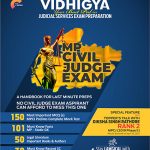The All India Law Entrance Test (AILET) is one of the most competitive law entrance exams in India, conducted by the National Law University (NLU), Delhi. Known for its rigorous structure and high competition level, AILET demands not only subject knowledge but also strategic preparation, mental resilience, and time management skills.
1. Understanding the Exam Pattern and Syllabus
One of the initial challenges for AILET aspirants is familiarizing themselves with the unique exam pattern and comprehensive syllabus. AILET consists of multiple sections, including English, Logical Reasoning, and General Knowledge, each requiring a different approach. The paper includes 150 questions to be completed in 1 hour and 30 minutes, which demands speed and accuracy.
How to Overcome This Challenge:
- Analyze Previous Year Papers: Begin by reviewing AILET question papers from previous years. This will help you understand the weightage of each section, the type of questions asked, and the level of difficulty.
- Understand Sectional Importance: Some sections may be more scoring than others. Focus on sections that carry more weightage and play to your strengths while improving in weaker areas.
- Create a Personalized Study Plan: Allocate specific hours to each section based on your comfort level and difficulty. For example, if you struggle with Logical Reasoning, dedicate more time to this section to build confidence and accuracy.
2. Time Management During Preparation and the Exam
Time management is crucial, both during preparation and in the actual exam. AILET’s time-bound format makes it challenging for students to attempt all questions while ensuring accuracy.
How to Overcome This Challenge:
- Practice with Timed Mock Tests: Regularly attempt mock tests under timed conditions. This not only enhances your speed but also conditions you to work under pressure. Analyze your performance after each test to identify areas where you can improve time efficiency.
- Use the Right Approach for Each Section: For instance, in the General Knowledge section, try to answer quickly, as this section generally involves factual questions rather than lengthy reasoning.
- Break Down Your Study Time: Divide study hours into smaller sessions with dedicated focus on different sections. This prevents burnout and helps you stay consistent with each section of the syllabus.
3. Difficulty in Managing Current Affairs and Static GK
The General Knowledge section in AILET is a mix of Current Affairs and Static GK. Keeping up with current affairs can be overwhelming, and many students find it challenging to remember historical facts, significant events, and general knowledge information.
How to Overcome This Challenge:
- Daily Newspaper Reading: Make a habit of reading a reliable newspaper, such as The Hindu or The Indian Express. Focus on national and international news, significant events, and legal developments. Additionally, keep a notebook to jot down important news items.
- Use Monthly Current Affairs Compilations: Many educational portals release monthly compilations of current affairs. These can be great for quick revision and ensure you don’t miss out on any important events.
- Use Flashcards for Static GK: For memorizing Static GK, use flashcards or mnemonic techniques. Revising these frequently can help retain information effectively.
4. Managing Stress and Maintaining Consistency
With AILET’s competitive nature, it’s easy for candidates to feel stressed and lose motivation, especially when they encounter difficult topics or struggle with mock test scores. This inconsistency can hinder overall progress.
How to Overcome This Challenge:
- Set Realistic Goals: Divide your preparation into smaller, achievable goals rather than setting overwhelming targets. Meeting these goals will boost your confidence and keep you motivated.
- Regular Breaks and Physical Activity: Ensure you’re not overworking yourself. Incorporate regular breaks and some form of physical activity to keep your mind refreshed.
- Seek Support and Guidance: If you feel stressed, consider discussing your challenges with mentors, teachers, or fellow aspirants. Sharing experiences and solutions can provide a sense of relief and new insights.
5. Strengthening Logical Reasoning Skills
Logical Reasoning is a core component of AILET and requires both critical thinking and analytical skills. Many students find this section tricky due to its complex problem-solving nature, and it can often consume a lot of time.
How to Overcome This Challenge:
- Practice with Sample Problems: Focus on practicing a variety of reasoning questions, such as syllogisms, logical puzzles, blood relations, and coding-decoding. Familiarity with question types will increase your speed and accuracy.
- Work on Basic Logical Concepts: Strengthen your foundation in logical concepts, including deductive reasoning, analogies, and sequences. Building a solid foundation helps you tackle complex questions.
- Analyze and Review Mistakes: After practicing questions, analyze where you went wrong. Understanding mistakes is crucial to prevent them from recurring in future practice sessions or during the exam.
6. Building Vocabulary and Comprehension Skills for English
The English section requires a strong grasp of vocabulary, grammar, and reading comprehension skills. Some candidates find it challenging to improve their vocabulary or comprehend lengthy passages under time constraints.
How to Overcome This Challenge:
- Read Widely: Develop a habit of reading books, editorials, and legal articles. This not only improves vocabulary but also enhances your ability to comprehend and analyze written content.
- Use Vocabulary Tools: Utilize apps and flashcards for vocabulary building. Target commonly asked words in AILET and law entrance exams.
- Practice Speed Reading: Time yourself when reading passages to develop a faster reading speed. Focus on understanding the main idea, supporting arguments, and tone of the passages, as these are frequently tested in AILET.
7. Balancing AILET Preparation with Other Responsibilities
Many AILET aspirants juggle their preparation alongside school studies or other entrance exams. Balancing these responsibilities can be challenging and may lead to divided focus and burnout.
How to Overcome This Challenge:
- Create a Realistic Study Schedule: Set up a balanced schedule that accommodates both AILET preparation and other responsibilities. Allocate specific hours to AILET subjects each day to ensure consistent progress.
- Prioritize and Set Boundaries: While it’s essential to balance multiple priorities, give AILET-focused study sessions undivided attention. Set clear study boundaries to avoid overlapping tasks.
- Seek Guidance for Time Management: Reach out to mentors, educators, or successful candidates to understand how they managed multiple responsibilities while preparing for AILET. You may get useful insights and time-saving strategies.
8. Preparing for Negative Marking
AILET imposes a penalty for incorrect answers, with each wrong answer deducting 0.25 points. This negative marking often intimidates candidates, leading to over-cautiousness or second-guessing, which impacts performance.
How to Overcome This Challenge:
- Develop a Selective Approach: Avoid the temptation to answer every question. Focus on accuracy rather than attempting the entire paper, especially if you are unsure of certain answers.
- Practice Smart Guessing: If you are partially sure of an answer, use elimination techniques to increase your chances of getting it right. Avoid wild guesses, as they can lead to unnecessary negative marking.
- Analyze Past Mistakes with Negative Marking: Review your mock tests to identify areas where you frequently make errors. This will help you exercise caution in these areas during the actual exam.
Conclusion
The AILET exam poses unique challenges that require a blend of strategy, hard work, and persistence to overcome. By understanding the exam structure, managing time effectively, and focusing on problem areas like logical reasoning, vocabulary, and current affairs, you can build a strong foundation for success.



